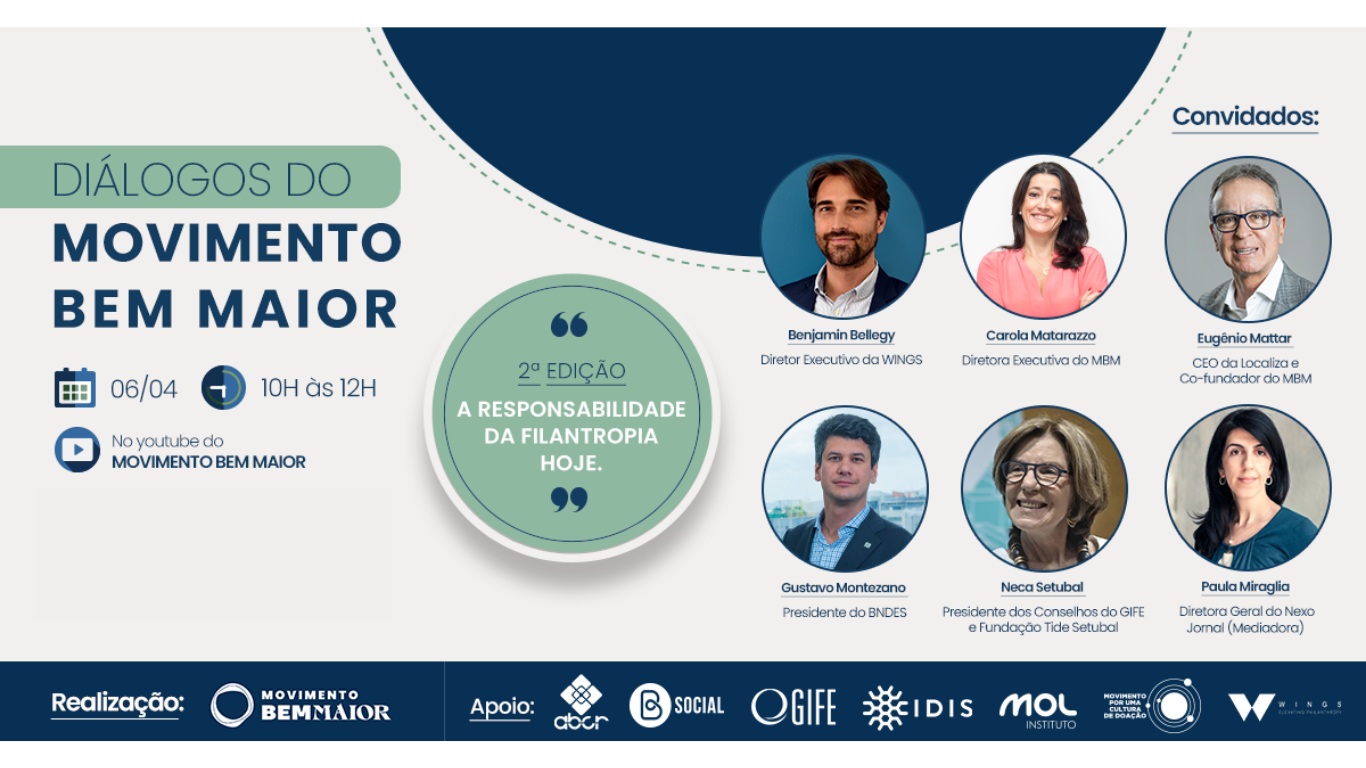Event discusses the role and formation of philanthropic networks in the country at a time of worsening health and economic crisis
Brazil experienced a boom in donations in the first moments of the new coronavirus pandemic in 2020. About two months after the start of the crisis, the amounts allocated to donations surpassed historical annual records – that is, never as much was donated as at the beginning of the health and economic crisis associated with the pandemic.
At the end of May 2020, the growth in the volume of money from philanthropy began to slow down and has practically stagnated since then, according to data from the Brazilian Association of Fundraisers' Donations Monitor.
R$6.73 billion was donated since the start of the pandemic in Brazil until the beginning of April 2021, according to the Donation Monitor of the Brazilian Association of Fundraisers.
In 2021, Brazil is experiencing the worst moment of the health crisis, at the same time as it faces the persistence of the economic recession. The worsening scenario once again highlighted inequality in the country and the social vulnerability of a considerable portion of the Brazilian population.
In this context, the Movimento Bem Maior – which brings together businesspeople who participate in philanthropic actions – organized the debate “Dialogues: the responsibility of philanthropy today” to discuss the role of private social investments in Brazil, whether during the pandemic or post-pandemic. The event, held on Tuesday (6), was mediated by Paula Miraglia, general director of Nexo.
Neca Setubal, president of the boards of Gife (Group of Institutes Foundations and Companies) and Fundação Tide Setubal, spoke about the urgency of social actions at the current time, given the situation of fragility and social helplessness in which many Brazilians find themselves. “The role of philanthropy in the very short term is food security. Philanthropy needs to articulate campaigns in this short-term moment to mobilize society as a whole – companies, the public sector – in this urgency of hunger,” she stated.
Setubal also highlighted the mission of consolidating the culture of donation in Brazil, so that this solidarity movement does not run out at the end of the pandemic. For her, this involves strengthening the articulations of different sectors of civil society, which need to focus on dialogue with those who are behind philanthropic actions. In other words, it is necessary to consider the vision of organizations and people close to the communities that will be helped. Setubal also reinforced the importance of companies acting and taking a stance on important contemporary issues, such as inequalities, climate issues and defending democracy.
“No sector or organization will be able, alone, to face the size of the crisis we are experiencing. This articulation within and between sectors is fundamental for philanthropy to consolidate itself in Brazilian society today”
Neca Setubal , president of the boards of Gife (Group of Institutes, Foundations and Companies) and Fundação Tide Setubal.
Eugênio Mattar, CEO of Localiza and co-founder of Movimento Bem Maior, spoke about the importance of stimulating philanthropic practice as a way of developing a culture of solidarity in Brazil. According to Mattar, donating and giving up resources is something that has a cost, but that can and should be seen from the perspective of positive return – which, according to him, has the potential to become a passion.
The businessman stated that more important than practicing philanthropy itself – which he defined as the donation of money, time or even advice to help another person – the action of donating has the powerful dimension of example, which helps to mobilize other agents and creating a social engagement network.
“As citizens, we can all practice philanthropy – from the simplest person to the most powerful person”
Eugênio Mattar , CEO of Localiza and co-founder of Movimento Bem Maior.
Also participating in the event was Gustavo Montezano, president of BNDES (National Bank for Economic and Social Development), who said he sees room for a partnership between the public and private sectors and the third sector. “When we talk about philanthropy, we talk about development. Therefore, it is the role of BNDES and public agents to leverage [philanthropy] and leverage philanthropy, developing culture and strengthening the market,” he stated.
According to Montezano, this articulation is favored by the incorporation of development premises in the companies' objectives. This is because companies are increasingly no longer guided solely by financial objectives, but also taking on the search for social and environmental returns. According to the president of BNDES, common development purposes justify bringing public agents closer to the philanthropy sector and what he called the “volunteer ecosystem”.
“The leverage of the public with the private – and not the public versus the private – is what will build Brazil’s new socio-environmental growth agenda”
Gustavo Montezano , president of BNDES (National Bank for Economic and Social Development)
Benjamin Bellegy, executive director of Wings, an international network that promotes philanthropy, stated that the consolidation of the culture of philanthropy in Brazil needs to be done with broad participation of different agents in society. “When we think about philanthropy, the first idea is always Bill Gates. But if you look at the data, the vast majority of grant money in the world comes from donations from the middle and lower class – more than from corporations or the richest,” he said.
Bellengy, therefore, defended that the Brazilian philanthropic network grows by exploiting the great potential of civil society agents, in addition to companies and the highest income brackets. He also said that the expansion of philanthropy in Brazil requires a change in mentality, with less risk aversion in social investments and greater incorporation of issues sensitive to Brazilian society, such as the defense of human rights.
“The focus must be on building a culture of donation in the population, at all levels: in the middle class, in the upper-middle class and also at the community level”
Benjamin Bellegy , executive director of Wings, an international network that promotes philanthropy.
The event also featured an opening and comments from Carola Matarazzo, executive director of Movimento Bem Maior. Matarazzo stated that Brazilian philanthropy needs to be carried out keeping in mind the impact it intends to generate on a community, and that it should not be tied to return metrics.
The closing speech was given by Rubens Menin, president of MRV and CNN Brasil, and co-founder of Movimento Bem Maior. The businessman reinforced the importance of philanthropy as a way of reducing inequalities in Brazil, and said that the potential returns on private social investments “are enormous”.
This text was originally published on the NEXO JORNAL , click here to access the article.



 ">
">


